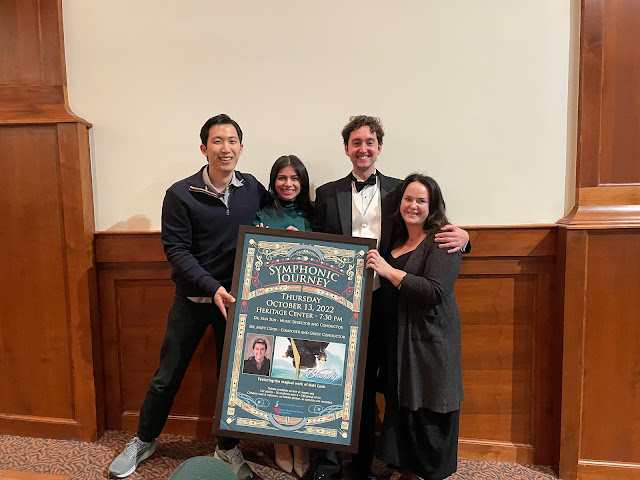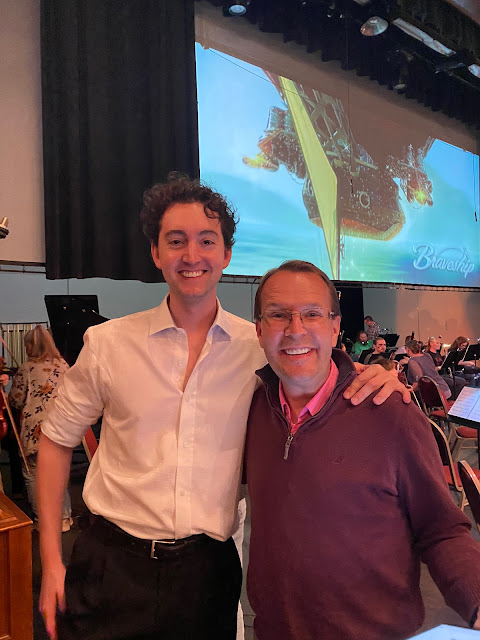By Stan Szczesny
On the night of October 13, 2022, the Orchestra of Southern Utah and SUU’s Opus performed Dr. Matt Cook’s Braveship at the Heritage Center in Cedar City. As a finale, the orchestra, along with soprano Ember Moat, also performed “Fly with Me,” another composition by Dr. Cook. Carylee Zwang conducted the orchestra, though Dr. Cook himself served as guest conductor for “March of the Ants,” which is the fourth movement of Braveship. Because Braveship is a multimedia experience that joins narrative and big-screen images to twelve movements of music, Michael Bahr performed the narrative passages between each movement.
Braveship uses music, imagery, and narrative to present a story. The music is the dominant force and feature of the presentation. The style of the music resembles orchestral movie soundtracks and twentieth-century programmatic tone-poems. The rhythms, textures and melodies are reminiscent of Prokofiev, Copland, Bernstein, Holst, and John Williams, especially the latter two. The emotions evoked by the music are by turns mysterious, whimsical, sentimental, and nostalgic for childhood fantasy. The movements as a whole are something of a mixed bag. Some, like “March of the Ants” “New World Landing,” and “Necklace of Memory” contain the sort of catchy, robust, simple melodies and rhythms that give one a sense of wonder and story. Other movements, like “Wings of Centaurs” and “Saber-Toothed Panther” feel musically busier and push the limits of complexity allowed for in practical instrumentation. The musicians in OSU did a fantastic job navigating the score, Opus enriched the sound with dramatic vocalise, and Maestro Zwang masterfully conducted with expression, confidence, and precision, but the score does not always evoke the emotional complexity and nuance one expects from great orchestral music, the latter movements do not variate sufficiently in style to provide relief from repetition, and the full composition lacks unifying thematic devices, such as leitmotif, and does not build any sense of direction or momentum from one piece to another, relying instead on the narrative and imagery to bridge the pieces together and to provide a sense of story. Overall, though it lacks classic simplicity and discipline, much of the music is of professional quality but might function better in standalone pieces.
The big-screen imagery for the presentation depicts a steampunk dirigible traveling through exotic landscapes among fantastic creatures. The humans are mostly impressionistic, but the creatures are finely characterized. In the age of CGI and IMAX, viewing stills is a bit quaint, but the live music assists the imagination, easing the burden of suspending disbelief. Besides, requiring audiences to participate more in imaginative work is hardly a vice and is often a welcome exercise.
As for the narrative, Dr. Cook excels in description and world-building. His narration recalls the wonder one feels as a child when viewing fantasy spectacles in the best adventure movies. As Braveship took flight, I felt grateful for the nostalgic feelings raised by the narrative. Michael Barr did a fine job inflecting, projecting, and enunciating each passage, so that I felt like a child listening to an enthusiastically read bedtime story. But as the performance continued, the narrative weaknesses became more apparent. Each interlude presented a disconnected succession of new exotic worlds and creatures, but attempts to impart meaningful motives, themes, choices, and development to the three main characters, Azra, Finn, and Helene, fell flat. There simply wasn’t enough time to develop complex narrative structures in the confines of a short concert, and the most interesting conflict—Helene’s desire to find her parents—remains unresolved as the narrative ends. The result is that the narrative sometimes feels like a distraction from the good music rather than an enhancement of the experience.
The concert ended with “Fly with Me,” a stand alone song by Dr. Cook. The music was simpler, and the orchestra handled it very well. The lyrics were a thematic fit with Braveship, making the piece a fine conclusion to the evening. The solo soprano, Ember Moat, sang competently with great intonation. The vocal and emotional range of the piece was technically difficult, but Ms. Moat made very good use of the opportunity to confidently perform for a large, sophisticated audience of musicians and concert patrons, and she is clearly a promising musician.
In conclusion, OSU, Opus, Dr. Cook, Ember Moat, and Michael Barr delivered a very good performance for the premiere of Braveship. The quality of the complete composition is uneven, but much of the music and imagery is sufficient to provide a pleasant evening at the concert hall. The narrative, at least the parts of it provided in the context of this orchestral presentation, needs work as a story, but was serviceable in evoking a sense of nostalgic wonder, and that is, I presume, Dr. Cook’s primary aim. I, for one, welcome every opportunity to return to the pleasant dreams and fantasies of childhood.











































